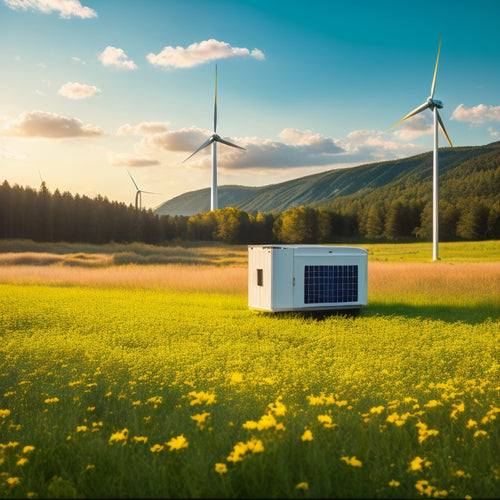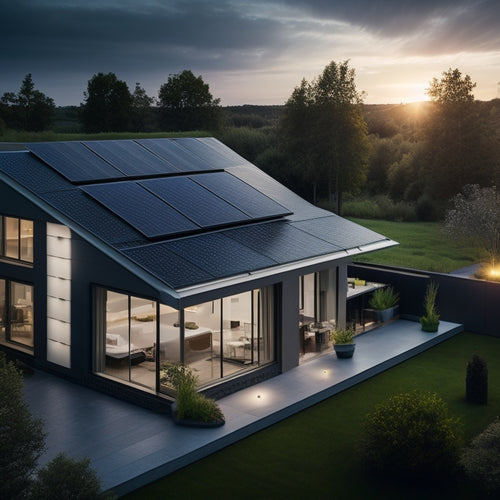
Bring Renewable Energy Into Your Home in 3 Simple Ways
Share
You can bring renewable energy into your home in three simple ways. First, consider installing solar panels, which can greatly cut your energy bills and increase your home's value. Second, conduct an energy audit to identify inefficiencies, allowing you to upgrade insulation and switch to LED lighting for better savings. Finally, implement smart technology, like thermostats, to optimize your energy use. Each step not only saves you money but also minimizes your carbon footprint. If you're curious about more strategies to enhance your home's energy efficiency, there's plenty more to investigate.
At a Glance
- Install solar panels to reduce energy bills and benefit from government incentives that offset installation costs.
- Conduct an energy audit to identify inefficiencies and prioritize energy efficiency upgrades, like insulation and LED lighting.
- Invest in smart thermostats to optimize heating and cooling, resulting in significant savings on energy expenses.
- Consider sustainable energy options such as geothermal heating or wind turbines to generate renewable electricity.
- Monitor your energy consumption regularly to identify peak usage hours and adjust habits for improved efficiency.
Cost-Effective Energy Solutions
When you consider solar panel installation and energy efficiency upgrades, you're looking at two powerful strategies to reduce your energy bills.
Investing in solar panels not only captures free sunlight but can also increase your home's value. Additionally, utilizing efficient solar cells can greatly lower your environmental impact while maximizing your energy savings.
Meanwhile, upgrading your home's efficiency guarantees you're making the most of the energy you use, maximizing savings in the long run.
Solar Panel Installation
Many homeowners are finding that solar panel installation can be a smart investment, offering significant long-term savings on energy bills. With recent solar technology advancements, these systems have become more efficient and affordable than ever. You're not just reducing your carbon footprint; you're also taking control of your energy costs.
The installation process is straightforward, typically involving an assessment of your roof's suitability, securing permits, and connecting the system to your home's power supply. Most qualified professionals can complete the job in just a few days, and many provide warranties that guarantee your investment is protected for years to come.
By utilizing the power of the sun, you can lower your dependence on traditional energy sources and shield yourself from rising utility prices. Additionally, many states offer incentives that can further offset installation costs, making it an even more attractive option.
Embracing solar energy gives you the freedom to generate your own power while contributing to a sustainable future.
Energy Efficiency Upgrades
Investing in energy efficiency upgrades can greatly reduce your utility bills while enhancing your home's comfort and sustainability. One of the first steps you should take is to conduct an energy audit. This assessment identifies areas where your home is losing energy and helps prioritize improvements. You'll realize that simple changes can yield significant savings.
Here's a handy table to guide your upgrades:
| Upgrade Type | Benefits |
|---|---|
| Insulation Upgrades | Reduces heat loss, lowers bills |
| Energy Audits | Pinpoints inefficiencies |
| LED Lighting | Cuts energy use, lasts longer |
| Smart Thermostats | Optimizes heating/cooling |
By focusing on insulation upgrades, you create a more energy-efficient environment. Enhanced insulation keeps your home warm in winter and cool in summer, giving you more control over your comfort.
These cost-effective solutions not only free up your finances but also contribute to a sustainable future. Accept energy efficiency, and you'll enjoy both the immediate benefits of lower bills and the long-term rewards of a greener lifestyle. Make the choice today for a more liberated tomorrow!
Environmental Impact Reduction
When you switch to renewable energy, you're taking a considerable step toward lowering your carbon footprint.
By choosing sustainable energy solutions, such as solar power, you can greatly reduce your reliance on fossil fuels and decrease greenhouse gas emissions.
This shift not only contributes to a healthier planet for future generations but also promotes energy independence and stability.
Embracing these eco-friendly options can change your home into a model of environmental responsibility, showcasing the financial benefits of solar power.
Lower Carbon Footprint
Shifting to renewable energy sources considerably lowers your carbon footprint, making a substantial impact on the environment. By utilizing solar, wind, or geothermal energy, you're not just powering your home sustainably; you're actively reducing greenhouse gas emissions.
This shift allows you to adopt a lifestyle that prioritizes the planet's health while enjoying the freedom of energy independence.
Incorporating carbon offsetting strategies can further enhance your efforts. For instance, investing in projects that plant trees or support renewable energy initiatives can counterbalance your emissions, amplifying your positive impact.
Additionally, consider sustainable transportation options like electric vehicles or public transit. These choices not only diminish your reliance on fossil fuels but also contribute to cleaner air and a healthier community.
Every decision you make, from the energy powering your appliances to how you commute, plays a role in shaping a sustainable future.
By committing to renewable energy and adopting carbon offsetting strategies alongside sustainable transportation, you're not just reducing your carbon footprint—you're championing a movement toward environmental freedom.
It's time to take control of your impact and inspire others to do the same.
Sustainable Energy Choices
How can you make a meaningful impact on the environment through your energy choices? Embracing sustainable energy options is a powerful way to reduce your carbon footprint and contribute to a healthier planet.
Consider installing geothermal heating, which makes use of the Earth's natural temperature to regulate your home's climate efficiently. This system not only cuts down on energy consumption but also lowers your utility bills, giving you both financial and environmental freedom.
Additionally, incorporating wind turbines into your energy plan can greatly enhance your sustainability efforts. Small-scale wind turbines can generate clean energy right in your backyard, capturing the power of the wind to provide a renewable source of electricity.
This choice enables you to take control of your energy production while reducing reliance on fossil fuels.
Key Benefits Overview
When you consider renewable energy for your home, you'll quickly notice two key benefits: reducing your environmental impact and achieving long-term cost savings.
By utilizing clean energy sources, you not only contribute to a healthier planet but also lower your utility bills over time.
Additionally, moving to solar power enhances your energy independence, providing you with greater control over your energy needs and energy autonomy.
These advantages make renewable energy a smart choice for both your wallet and the environment.
Environmental Impact Reduction
Why should you consider renewable energy for your home? By embracing renewable energy sources, you're not just cutting down on your electricity bills; you're also taking a significant step towards reducing your environmental impact. Utilizing green technology, you can adopt eco-friendly practices that contribute to a healthier planet for future generations.
Here's a quick overview of how renewable energy helps in environmental impact reduction:
| Benefit | Description |
|---|---|
| Reduced Carbon Footprint | Renewable energy sources emit little to no greenhouse gases. |
| Decreased Air Pollution | Shifting to solar or wind energy improves air quality. |
| Conservation of Resources | Utilizing renewable energy reduces reliance on finite fossil fuels. |
| Biodiversity Protection | Less habitat destruction occurs when using clean energy sources. |
| Sustainable Development | Renewable energy promotes a balanced ecosystem and economic stability. |
Long-term Cost Savings
Investing in renewable energy can lead to considerable long-term cost savings for homeowners. By incorporating solar panels, wind turbines, or geothermal systems, you're not just making an eco-friendly choice; you're also enhancing your financial freedom.
These systems greatly reduce or even eliminate your electricity bills, allowing for better budget planning.
As you consider investment strategies, it's essential to weigh the initial costs against future savings. While the upfront investment may seem intimidating, the return on investment can be exceptional. Most renewable energy systems pay for themselves within a few years, thanks to government incentives and decreasing installation costs.
Moreover, renewable energy increases your property's value. Homes equipped with these technologies often sell for more, appealing to eco-conscious buyers. This added value is a smart consideration in your long-term financial planning.
In a world where energy prices fluctuate unpredictably, renewable energy provides a stable, self-sufficient alternative. By investing now, you're not only securing your financial future but also embracing the freedom that comes from being less dependent on traditional energy sources.
Assess Your Energy Consumption
To make the most of renewable energy, you need to track your monthly energy usage.
By identifying your peak hours, you can adjust your consumption patterns to maximize efficiency and savings.
Understanding these details not only helps you choose the right renewable solutions but also enables you to take control of your energy costs.
Track Monthly Usage
Tracking your monthly energy usage is essential for understanding how much power your home consumes and identifying opportunities for improvement. By implementing energy monitoring practices, you can gain significant revelations into your usage patterns and pinpoint areas where you can reduce waste.
Start by reviewing your utility bills each month; they provide a clear depiction of your energy consumption over time.
Consider investing in smart energy monitors that offer real-time data on your energy use. These tools not only track your consumption but can also help you visualize trends, making it easier to see where you might cut back. For instance, you'll notice if certain appliances consistently draw more energy than others, giving you the chance to make informed decisions about upgrades or usage.
Additionally, tracking your energy usage allows you to set achievable goals. You might aim to reduce your consumption by a specific percentage, which not only saves money but also contributes to a more sustainable lifestyle.
Identify Peak Hours
Identifying peak hours of energy consumption is essential for optimizing your home's energy usage. By understanding when your household experiences peak demand, you can make informed decisions that reduce your energy costs and enhance your reliance on renewable energy sources.
Start by implementing energy monitoring tools, which can provide revelations into your consumption patterns. These tools help you see when your energy use spikes, allowing you to identify those critical hours.
Once you pinpoint your peak hours, you can shift high-energy tasks—like running the dishwasher or doing laundry—to off-peak times when energy rates are lower. This not only saves you money but also lessens the strain on the grid during peak demand periods.
Moreover, using smart home technology can automate this process. For example, programmable devices can be set to operate during off-peak hours, ensuring that you maximize your energy efficiency effortlessly.
Higher Long-Term Savings Potential
Switching to renewable energy can greatly reduce your utility bills over time.
By utilizing solar or wind power, you're not only lowering your monthly expenses but also protecting yourself from rising energy costs.
In the long run, investing in renewable energy systems means more money stays in your pocket, enhancing your overall financial stability.
Reduced Utility Bills
Over the years, many homeowners have uncovered that investing in renewable energy can lead to notably reduced utility bills. By utilizing solar power or wind energy, you not only cut down on your monthly expenses but also gain greater control over your energy consumption.
This change enables you to adopt energy conservation practices, ensuring you're not at the mercy of fluctuating utility rates.
Moreover, many states offer utility incentives for those who opt for renewable energy solutions. These incentives can appreciably lower your initial investment, making it easier to shift to a more sustainable lifestyle.
As you reduce your dependency on traditional energy sources, you'll notice an immediate impact on your bills, and this effect compounds over time.
Think of it as a long-term investment in your freedom—a way to escape the constraints of rising utility costs. Not only will you enjoy the benefits of lower bills, but you'll also contribute to a healthier planet.
Frequently Asked Questions
What Are the Best Renewable Energy Sources for Residential Use?
When considering the best renewable energy sources for your home, think about solar panels, wind turbines, geothermal heating, and biomass energy. Don't forget energy storage to maximize efficiency and independence in your energy consumption.
How Do I Choose the Right Renewable Energy System for My Home?
Imagine a gardener selecting the perfect seeds. To choose the right renewable energy system for your home, assess your energy needs and prioritize system efficiency. This guarantees your investment flourishes, granting you energy independence and sustainability.
Are There Any Government Incentives for Using Renewable Energy at Home?
Yes, there're government incentives for renewable energy at home. You can benefit from tax credits and energy rebates, making it more affordable to adopt sustainable solutions. It's a smart move towards energy independence and financial freedom.
How Much Maintenance Do Renewable Energy Systems Typically Require?
Renewable energy systems usually need minimal maintenance, which can enhance system longevity and reduce maintenance costs. Regular checks guarantee efficiency, allowing you to enjoy freedom from energy worries while investing in sustainable solutions for your home.
Can I Combine Different Renewable Energy Sources in My Home?
Absolutely, you can create a harmony of hybrid systems in your home. By combining solar panels and wind turbines, you'll enhance energy efficiency and utilize nature's power, giving you greater freedom and sustainability.
Explore More
By embracing renewable energy solutions, you not only cut costs but also contribute to a healthier planet. Imagine reducing your carbon footprint while enjoying lower utility bills—it's a win-win. As you assess your energy consumption, you'll likely uncover opportunities for greater efficiency, aligning your financial goals with environmental responsibility. The higher long-term savings potential isn't just a coincidence; it's a strategic choice that benefits both your wallet and the world. Now's the time to make that change!
Related Posts
-

Is This the Future of Alternative Energy Systems
Yes, alternative energy systems are shaping the future of energy. Innovations in solar and wind technologies are driv...
-

Sustainable and Eco-Friendly Generators for a Reduced Carbon Footprint
Sustainable and eco-friendly generators are perfect for cutting your carbon footprint and increasing energy efficienc...
-

Home Solar Battery
You're opting for a home solar battery that allows you to utilize the power of the sun during the day and use it at n...


